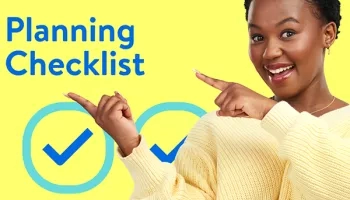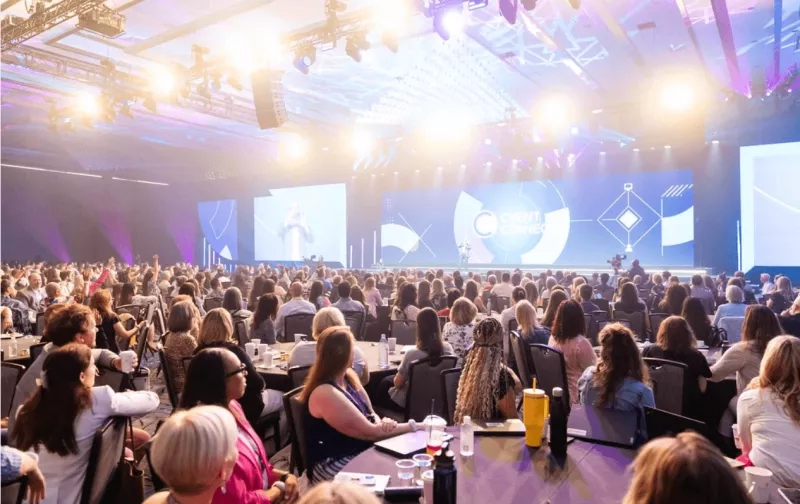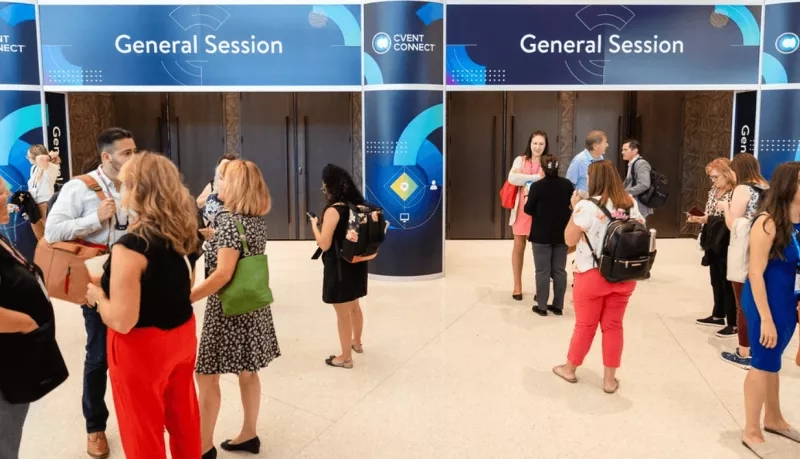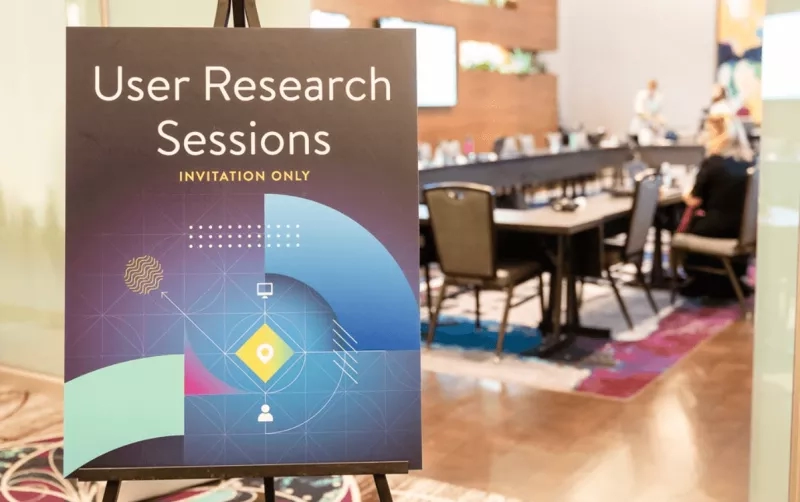
In the world of event management, few tools are as essential—and often underappreciated—as the conference agenda. At a glance, it's a simple schedule. Dive deeper; you'll find it's the backbone of a successful conference, ensuring every participant, speaker, and organizer is in harmony. From the structure to the sequence, every detail of an agenda contributes to the conference's outcome.
In this post, we'll discuss the ins and outs of the conference agenda, from its definition to its creation. Let's unlock its potential to make your next conference the best it can be!
What is a Conference Agenda?
A conference agenda is more than a mere outline of activities—it's the blueprint of the entire event. Think of it as the guidebook that directs attendees through the maze of sessions, speakers, and venues. Specifically, it outlines:
- The scheduled events and activities.
- Venues for each activity.
- Timing for commencement and conclusion of sessions.
- Details of the keynote speaker or panel discussions.
Given these details, attendees are saved from aimless wandering. Instead, they're clear on where to be and when and select sessions that align with their interests.
Beyond serving the attendees, the agenda also plays a pivotal role for organizers. It offers insights into the event's flow and highlights areas that may need adjustments, like potential timing clashes.
Importance of an Agenda in a Conference
Injecting structure into your conference doesn't stifle creativity but enhances the overall experience. Here's why adopting a template for your agenda can elevate event planning and your conference in general:
- Efficient time management: An agenda ensures conversations, no matter how engaging, stick to their allotted times, preserving the event's flow.
- Streamlined conference experience: Directing attendees efficiently and outlining breaks clearly ensures a smooth experience without chaos and confusion.
- Elevated discussions: With logistics well in hand, speakers can channel their energy into delivering riveting and impactful discussions.
- Boosting attendee enthusiasm: An early glimpse of the agenda can ignite excitement among attendees. Making it accessible even before registration can also serve as a magnet for potential participants.
- Cost-effectiveness: A defined structure, as presented by the agenda, offers clarity on resource needs, paving the way for optimized budgeting.
How Does Conference Agenda Enhance Attendee Engagement?
Here are some of the key ways a well-crafted conference agenda can enhance attendee engagement:
- Highlights essential sessions and events: The agenda helps attendees prioritize and make the most of their time. They can focus on sessions they find most relevant.
- Encourages networking: Scheduling dedicated networking and breakout sessions allows attendees to connect with peers to foster a sense of community.
- Promotes interaction: Sessions incorporating Q&As, panels, or audience response systems involve attendees actively. Note these types of interactive formats in the agenda.
- Allows personalization: With the full schedule available, attendees can pick and choose sessions based on their interests and build their own personalized agenda.
- Provides conversation starters: Unique sessions or speakers can kickstart conversations between attendees before and after the event.
- Generates excitement: A dynamic agenda with intriguing session titles and high-profile speakers builds hype and engages attendees in participating.
- Offers a flexible structure: While the agenda provides the conference schedule, it can also have open spaces or "free choice" segments that give attendees agency.
- Highlights agenda additions: Promote exciting new sessions, speakers, or events added late with updates to the agenda to maintain momentum.
- Guides the attendee journey: A well-planned agenda guides attendees seamlessly through the event and leaves them with a satisfying experience from start to finish.
The result is that attendees feel informed, empowered, and enthusiastic throughout the conference, leading to greater engagement and satisfaction.
Things to Include in a Conference Agenda
A comprehensive conference agenda serves as a roadmap for organizers and attendees, guiding them through the event. Here's a breakdown of essential elements that should be included in a conference agenda:
Header:
- Title of the Conference: Clearly state the name of the conference or event.
- Date & Time: Provide the conference's starting and ending dates and times.
- Location: List the venue address and any specific room or hall details.
- Contact Information: Include the details of the primary point of contact or event organizer.
Welcome Note/Introduction:
- Opening Remarks: A brief note or message from a prominent figure or the conference chair.
- Purpose of the Conference: Clarify the event's objectives or goals.
Session Details:
- Session Title/Topic: Clearly label each session or workshop topic.
- Description: A brief summary of the session's content.
- Speakers/Panelists: List the names and titles of presenters or panelists.
- Start and End Times: Specify exact timings to maintain punctuality.
- Venue/Room Number: If the conference has multiple tracks or simultaneous sessions.
Breaks & Social Events:
- Lunch, Tea, or Coffee Breaks: Specify timings and locations.
- Networking Events: Details about receptions, mixers, or dinners.
- Entertainment or Cultural Shows: If any are scheduled.
Interactive Elements:
- Q&A Sessions: Mention timings and procedures for audience interaction.
- Workshops: Details about hands-on sessions or group activities.
- Polls or Surveys: Information on when and how they'll be conducted.
Logistical Information:
- Registration Desk Details: Location and operating hours.
- Wi-Fi Access: Instructions or credentials for connectivity.
- Emergency Exits & Safety Protocols: Ensure attendee safety.
- Facilities Information: Details about restrooms, prayer rooms, lactation rooms, etc.
Sponsors and Partners:
- Acknowledgments: List and thank sponsors, exhibitors, or partners.
- Exhibition Hall Details: Provide timings and location details if there's an exhibition segment.
Closing Remarks:
- Summary or Recap: Highlight key takeaways or announce future events.
- Feedback: Encourage attendees to provide feedback, perhaps through a form or app.
Attachments or Links:
- Conference Materials: PDFs, presentation slides, or supplementary resources.
- Interactive Maps: For larger venues, a map can help attendees navigate.
Remember, the format and specifics can vary based on the nature of the conference, its duration, and the target audience. However, the primary objective remains: to offer clarity and structure, enhancing the attendee experience.
10 Tips To Create A Well-Structured Conference Agenda
An attendee's experience at an event hinges on the organization of event content. Thus, crafting a well-structured conference agenda is essential. Not only does it guide attendees, but it also helps organizers track engagement, gather feedback, and highlight sponsorship opportunities.
Here are a few tips to remember while creating a top-notch conference agenda:
- Conduct pre-event surveys: Understand attendee preferences by embedding survey questions in the conference registration or through email campaigns and the event app. Questions can address expected takeaways, session preferences, and networking hopes.
- Include conference agenda in the event app: Integrate your conference agenda with an event app by leveraging technology. This offers easy access to sessions, creates conference networking opportunities, and showcases speakers and sponsors.
- Provide multiple agenda views: Cater to different attendee preferences by offering various agenda views, such as by room, speaker, or track. The choice of views should align with your event's structure.
- Embed agenda in calendars: Offer attendees the option to integrate the conference agenda into their personal calendars, adding a touch of personal relevance to their event experience.
- Boost attendee engagement: Make your agenda interactive by allowing session ratings and feedback. Such engagement enhances the attendee experience and provides crucial data for organizers.
- Embed live polls in the agenda: Encourage real-time engagement by integrating live polls. These can offer immediate feedback and can be adjusted based on responses during the event.
- Spotlight sponsors in the agenda: Use the frequently accessed event agenda as a platform for sponsors. Featuring sponsored sessions or polls can offer them valuable visibility.
- Leverage agenda analytics: To truly gauge the impact of your event, ensure your conference agenda tool provides post-event analytics. Metrics like these can validate event ROI and inform future decisions.
- Brand your agenda: The agenda should resonate with your event's brand. Utilize design tools to ensure consistency in fonts, colors, and aesthetics across all event facets.
- Opt for conference management tool: Choosing an all-in-one conference management platform ensures cohesive agenda creation. Whether it's analytics or app syncing, ensure the software's capabilities match your agenda goals.
Conference Agenda: More Than a Schedule
Crafting a precise, engaging, and accessible agenda elevates the attendee experience and streamlines event execution for organizers. Dive into the details, prioritize your attendees' journey, and let your conference agenda be the beacon that guides a successful event.









